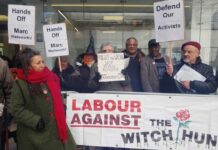17 JULY 2024 | OPINION
Today, the King’s Speech included elements of Prime Minister Sir Keir Starmer’s programme for radical change.
The first indication came even before His Majesty began to speak. It is a tiny thing, yet meaningful. By tradition, the Lord Chancellor approaches the throne and delivers the printed text of the speech, then retreats backwards respectfully.
But in 1998, New Labour introduced the option for the Lord Chancellor to turn their back on the monarch, which Shabana Mahmood has just done. I think Charles’ glance as she begins her turn shows him noting the significance.
There are other straws in the wind signalling forces trying to tear the Union apart: one Labour MP – Clive Lewis – had to retake the Oath of Allegiance after saying he was doing so under protest and in the hope of our becoming a republic; two Northern Irish SDLP MPs prefaced their oaths by indicating their commitment to a united Ireland; four independent Muslim candidates took on Labour and became MPs, cheered on by The Muslim Vote, which seeks to give a sectarian theocratic flavour to British democracy.
These elements could easily be managed by a government with a huge majority; but the Government is itself even more radical. Undeterred by the fact that it got only a third of votes in the General Election, which multiplied by a low turnout equals positive support from only a fifth of the electorate, Labour presses on with the plan with which Starmer tasked former Labour PM Gordon Brown four years ago.
‘Power devolved is power retained’. The method is to sub-contract parliamentary powers so as to place them beyond critical examination in the Commons, while setting the agenda for new quangos and ‘new powers for metro mayors and combined authorities’.
We have seen how localisation creates fiefdoms and petty tyrannies in London, Scotland and Wales – with a stronger grip, because local elections see even less participation from voters, who know even less about their local politicians because the Fourth Estate tells them less.
The King dutifully read out ‘his’ Government’s plan for ‘greater devolution in decision-making’, while at the same time speaking of town planning reform to ‘accelerate delivery’ and presumably override local objections.
The railway companies would be brought under state control and at least partly into public ownership; Great British Energy would aim for clean energy that would lower bills; there would be more offshore windmills. Work would be done to develop sustainable aviation fuel production.
There would be ‘a new partnership with businesses and working people’; this partnership would involve audits of corporate governance, bearing down on exploitative practices and enhancing employment rights.
And so on. So far, so high-minded, though there is a sense that collabration will be forced on some parties, who may choose to disengage. Elon Musk has just decided to move SpaceX and Twitter/X to Texas to escape Californian prodnosery; 500,000 millionaires are predicted to leave the UK by 2028.
The writer Aldous Huxley argued that the ends do not justify the means. We should instead concentrate on the means we employ. If those are good, the ends will take care of themselves.
The central issue for our age, across the First World, is how to stop our representatives running away with the power we loan to them, deciding for themselves what it is we need (or what suits them) and then giving it to us, willy-nilly. Here in Britain, the Crown in Parliament could turn them back – so it must go.
The debates on Starmer’s big, top-down technocratic schemes will be held in the coming days. Will the Oysters make themselves heard to the Walrus and the Carpenter?


























